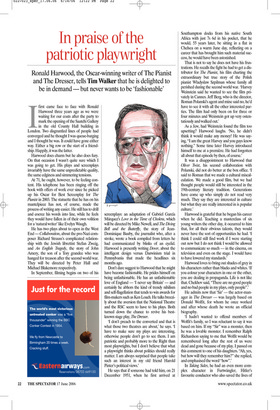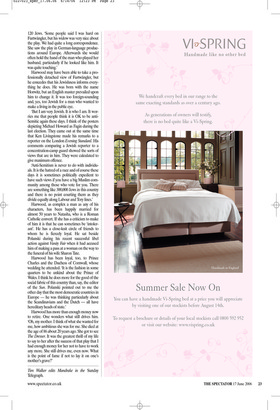In praise of the patriotic playwright
Ronald Harwood, the Oscar-winning writer of The Pianist and The Dresser, tells Tim Walker that he is delighted to be in demand — but never wants to be ‘fashionable’ Ifirst came face to face with Ronald Harwood three years ago as we were waiting for our coats after the party to mark the opening of the Saatchi Gallery in the old County Hall building in London. Two disgruntled lines of people had converged and he thought I was queue-barging and I thought he was. It could have gone either way. Either a big row or the start of a friendship. Happily, it was the latter.
Harwood does charm but he also does fury. On that occasion I wasn’t quite sure which I was going to get. His plays and screenplays invariably have the same unpredictable quality, the same edginess and simmering tensions.
At 71, he ought, however, to be feeling content. His telephone has been ringing off the hook with offers of work ever since he picked up his Oscar for Best Screenplay for The Pianist in 2003. The statuette that he has on his mantelpiece has not, of course, made the process of writing any easier. He still has to drill and coerce his words into line, while he feels they would have fallen in of their own volition for a ‘natural writer’ like Evelyn Waugh.
He has two plays about to open in the West End — Collaboration, about the pro-Nazi composer Richard Strauss’s complicated relationship with the Jewish librettist Stefan Zweig, and An English Tragedy, the story of John Amery, the son of a Tory grandee who was hanged for treason after the second world war. They will be directed by Peter Hall and Michael Blakemore respectively.
In September, filming begins on two of his screenplays: an adaptation of Gabriel García Márquez’s Love in the Time of Cholera, which will be directed by Mike Newell, and The Diving Bell and the Butterfly, the story of JeanDominique Bauby, the journalist who, after a stroke, wrote a book compiled from letters he had communicated by blinks of an eyelid. Harwood is presently writing Dover, about the intelligent design versus Darwinism trial in Pennsylvania that made the headlines six months ago.
Don’t dare suggest to Harwood that he might have become fashionable. He prides himself on being unfashionable. He has an unfashionable love of England — ‘I never say Britain’ — and certainly he abhors the kind of trendy nihilism and self-flagellation that tends to win awards for film-makers such as Ken Loach. He talks breezily about the aversion that the National Theatre and the RSC seem to have to his plays. Both turned down the chance to revive his bestknown stage play, The Dresser.
‘I don’t preach to the converted and that is what those two theatres are about,’ he says. ‘I have to make sure my plays are interesting, otherwise people don’t go to see them. I am patriotic and probably more to the Right than most playwrights, but I don’t believe that what a playwright thinks about politics should really matter. I am always surprised that people take such an interest in my old friend Harold Pinter’s political views.’ He says that if someone had told him, on 21 December 1951, when he first arrived at Southampton docks from his native South Africa with just 7s 6d in his pocket, that he would, 55 years later, be sitting in a flat in Chelsea on a warm June day, reflecting on a career that has brought him such material success, he would have been astonished.
That is not to say he does not have his frustrations. He recalls the fight he had to get a distributor for The Pianist, his film charting the extraordinary but true story of the Polish pianist Wladyslaw Szpilman whose family all perished during the second world war. ‘Harvey Weinstein said he wanted to see the film privately in Cannes. Jeff Berg, who is the director, Roman Polanski’s agent and mine said no, he’d have to see it with all the other interested parties. The film had only been on for three or four minutes and Weinstein got up very ostentatiously and walked out.’ As a Jew, had Weinstein found the film too upsetting? Harwood laughs. ‘No, he didn’t think it would make any money! He was saying, “I am the great Harvey and you guys know nothing.” Some time later Harvey introduced himself to me at a première. He had forgotten all about that episode by then, of course.’ It was a disappointment to Harwood that Oliver Twist, his second collaboration with Polanski, did not do better at the box office. ‘I said to Roman that we made a cultural miscalculation. We made a good film, but we had thought people would still be interested in the 19th-century literary tradition. Generations have come up who simply do not read very much. They say they are interested in culture but what they are really interested in is popular culture.’ Harwood is grateful that he began his career when he did. Teaching a masterclass of six young writers the other day, it occurred to him that, for all their obvious talents, they would never have the sort of opportunities he had. ‘I think I could still find work if I were starting out now but I do not think I would be allowed to communicate so much — in the cinema, on television and even on the stage. I would have to have lowered my standards.’ Harwood loves to bring out shades of grey in his characters rather than blacks and whites. ‘If you colour your characters in one or the other, you are dealing in propaganda. Life is not like that. Chekhov said, “There are no good people and no bad people in my plays, only people”.’ He admits now that ‘Sir’ — the actor-manager in The Dresser — was largely based on Donald Wolfit, for whom he once worked and after whose death he wrote an official biography.
‘I hadn’t wanted to offend members of Wolfit’s family, so I was reluctant to say it was based on him. If my “Sir” was a monster, then he was a lovable monster. I remember Ralph Richardson saying to me that Wolfit would be remembered long after the rest of us were dead and gone because of my play. I passed on this comment to one of his daughters. “Ah, yes, but how will they remember him?” she replied, and emphasised the word “how”.’ In Taking Sides, he had an even more complex character in Furtwängler, Hitler’s favourite conductor who also saved the lives of 120 Jews. ‘Some people said I was hard on Furtwängler, but his widow was very nice about the play. We had quite a long correspondence. She saw the play in German-language productions around Europe. Afterwards she would often hold the hand of the man who played her husband, particularly if he looked like him. It was quite touching.’ Harwood may have been able to take a professionally detached view of Furtwängler, but he concedes that his Jewishness informs everything he does. He was born with the name Horwitz, but an English master prevailed upon him to change it. It was too foreign-sounding and, yes, too Jewish for a man who wanted to make a living in the public eye.
‘But I am very Jewish. It is who I am. It worries me that people think it is OK to be antiSemitic again these days. I think of the posters depicting Michael Howard as Fagin during the last election. They came out at the same time that Ken Livingstone made his remarks to a reporter on the London Evening Standard. His comments comparing a Jewish reporter to a concentration-camp guard showed the sorts of views that are in him. They were calculated to give maximum offence.
‘Anti-Semitism is never to do with individuals. It is the hatred of a race and of course these days it is sometimes politically expedient to have such views if you have a big Muslim community among those who vote for you. There are something like 300,000 Jews in this country and there is no point courting them as they divide equally along Labour and Tory lines.’ Harwood, as complex a man as any of his characters, has been happily married for almost 50 years to Natasha, who is a Roman Catholic convert. If she has a criticism to make of him it is that he can sometimes be ‘intolerant’. He has a close-knit circle of friends to whom he is fiercely loyal. He sat beside Polanski during his recent successful libel action against Vanity Fair when it had accused him of making a pass at a woman on the way to the funeral of his wife Sharon Tate.
Harwood has been loyal, too, to Prince Charles and the Duchess of Cornwall, whose wedding he attended. ‘It is the fashion in some quarters to be unkind about the Prince of Wales. I think he does more for the good of the social fabric of this country than, say, the editor of the Sun. Polanski pointed out to me the other day that the most democratic countries in Europe — he was thinking particularly about the Scandinavians and the Dutch — all have hereditary heads of state.’ Harwood has more than enough money now to retire. One wonders what still drives him. ‘Oh, my mother. I think of what she wanted for me, how ambitious she was for me. She died at the age of 86 about 20 years ago. She got to see The Dresser. It was the greatest thrill of my life to say to her after the success of that play that I had enough money for her not to have to work any more. She still drives me, even now. What is the point of fame if not to lay it on one’s mother’s grave?’



















































































 Previous page
Previous page